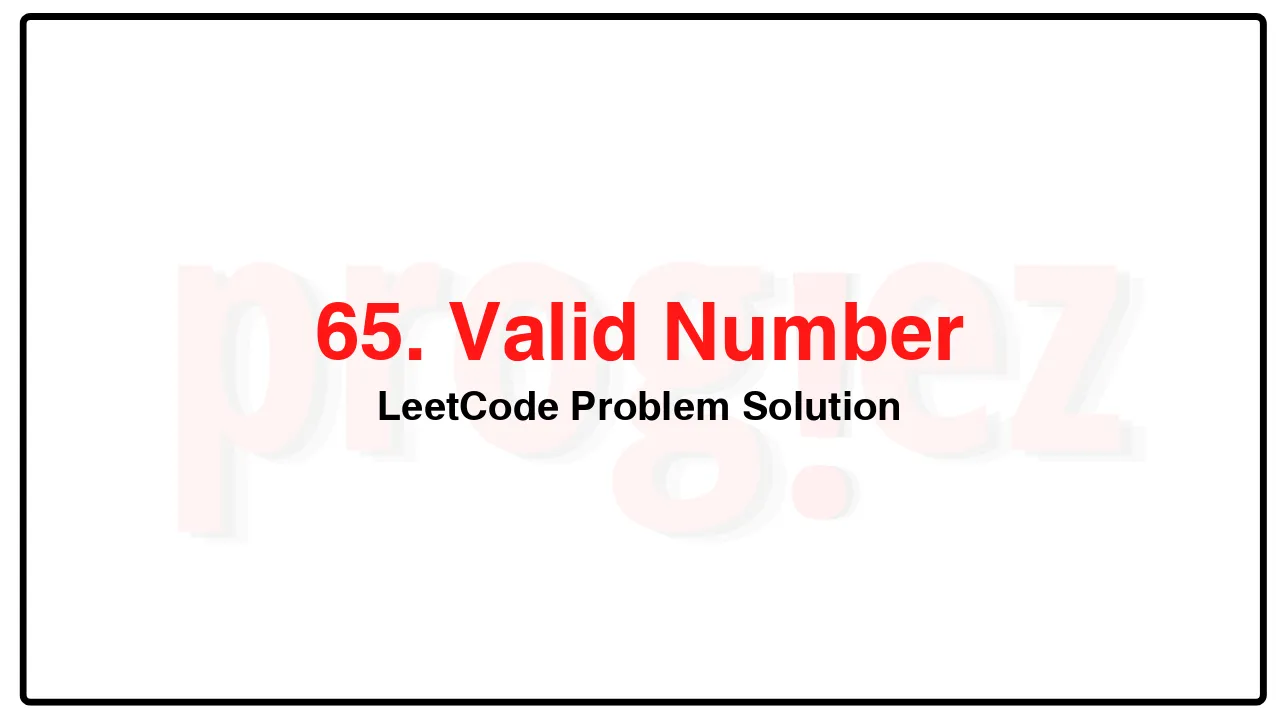65. Valid Number LeetCode Solution
In this guide, you will get 65. Valid Number LeetCode Solution with the best time and space complexity. The solution to Valid Number problem is provided in various programming languages like C++, Java, and Python. This will be helpful for you if you are preparing for placements, hackathons, interviews, or practice purposes. The solutions provided here are very easy to follow and include detailed explanations.
Table of Contents
- Problem Statement
- Complexity Analysis
- Valid Number solution in C++
- Valid Number solution in Java
- Valid Number solution in Python
- Additional Resources

Problem Statement of Valid Number
Given a string s, return whether s is a valid number.
For example, all the following are valid numbers: “2”, “0089”, “-0.1”, “+3.14”, “4.”, “-.9”, “2e10”, “-90E3”, “3e+7”, “+6e-1”, “53.5e93”, “-123.456e789”, while the following are not valid numbers: “abc”, “1a”, “1e”, “e3”, “99e2.5”, “–6”, “-+3”, “95a54e53”.
Formally, a valid number is defined using one of the following definitions:
An integer number followed by an optional exponent.
A decimal number followed by an optional exponent.
An integer number is defined with an optional sign ‘-‘ or ‘+’ followed by digits.
A decimal number is defined with an optional sign ‘-‘ or ‘+’ followed by one of the following definitions:
Digits followed by a dot ‘.’.
Digits followed by a dot ‘.’ followed by digits.
A dot ‘.’ followed by digits.
An exponent is defined with an exponent notation ‘e’ or ‘E’ followed by an integer number.
The digits are defined as one or more digits.
Example 1:
Input: s = “0”
Output: true
Example 2:
Input: s = “e”
Output: false
Example 3:
Input: s = “.”
Output: false
Constraints:
1 <= s.length <= 20
s consists of only English letters (both uppercase and lowercase), digits (0-9), plus '+', minus '-', or dot '.'.
Complexity Analysis
- Time Complexity: O(n)
- Space Complexity: O(1)
65. Valid Number LeetCode Solution in C++
class Solution {
public:
bool isNumber(string s) {
trim(s);
if (s.empty())
return false;
bool seenNum = false;
bool seenDot = false;
bool seenE = false;
for (int i = 0; i < s.length(); ++i) {
switch (s[i]) {
case '.':
if (seenDot || seenE)
return false;
seenDot = true;
break;
case 'e':
case 'E':
if (seenE || !seenNum)
return false;
seenE = true;
seenNum = false;
break;
case '+':
case '-':
if (i > 0 && s[i - 1] != 'e' && s[i - 1] != 'E')
return false;
seenNum = false;
break;
default:
if (!isdigit(s[i]))
return false;
seenNum = true;
}
}
return seenNum;
}
private:
void trim(string& s) {
s.erase(0, s.find_first_not_of(' '));
s.erase(s.find_last_not_of(' ') + 1);
}
};
/* code provided by PROGIEZ */65. Valid Number LeetCode Solution in Java
class Solution {
public boolean isNumber(String s) {
s = s.trim();
if (s.isEmpty())
return false;
boolean seenNum = false;
boolean seenDot = false;
boolean seenE = false;
for (int i = 0; i < s.length(); ++i) {
switch (s.charAt(i)) {
case '.':
if (seenDot || seenE)
return false;
seenDot = true;
break;
case 'e':
case 'E':
if (seenE || !seenNum)
return false;
seenE = true;
seenNum = false;
break;
case '+':
case '-':
if (i > 0 && s.charAt(i - 1) != 'e' && s.charAt(i - 1) != 'E')
return false;
seenNum = false;
break;
default:
if (!Character.isDigit(s.charAt(i)))
return false;
seenNum = true;
}
}
return seenNum;
}
}
// code provided by PROGIEZ65. Valid Number LeetCode Solution in Python
class Solution:
def isNumber(self, s: str) -> bool:
s = s.strip()
if not s:
return False
seenNum = False
seenDot = False
seenE = False
for i, c in enumerate(s):
if c == '.':
if seenDot or seenE:
return False
seenDot = True
elif c == 'e' or c == 'E':
if seenE or not seenNum:
return False
seenE = True
seenNum = False
elif c in '+-':
if i > 0 and s[i - 1] not in 'eE':
return False
seenNum = False
else:
if not c.isdigit():
return False
seenNum = True
return seenNum
# code by PROGIEZAdditional Resources
- Explore all LeetCode problem solutions at Progiez here
- Explore all problems on LeetCode website here
Happy Coding! Keep following PROGIEZ for more updates and solutions.